-
Table of Contents
How to Rebuild Trust After a Conflict in a Team
Conflict is an inevitable part of any team dynamic. Whether it arises from differing opinions, miscommunication, or competition for resources, the fallout can lead to a breakdown of trust among team members. Rebuilding that trust is crucial for restoring team cohesion and productivity. This article explores effective strategies for rebuilding trust after a conflict, supported by research and real-world examples.
Understanding the Importance of Trust in Teams
Trust is the foundation of any successful team. According to a study by the Institute for Corporate Productivity, high-trust teams are 50% more productive and 76% more engaged than low-trust teams. When trust is compromised, team members may become disengaged, leading to decreased collaboration and innovation.
Steps to Rebuild Trust After Conflict
Rebuilding trust is a process that requires intentional effort and commitment from all team members. Here are some effective steps to facilitate this process:
- Open Communication: Encourage team members to express their feelings and perspectives regarding the conflict. This can be done through one-on-one meetings or team discussions. Open communication helps to clear misunderstandings and fosters empathy.
- Acknowledge the Conflict: Recognize the conflict and its impact on the team. Ignoring the issue can lead to resentment and further distrust. Acknowledgment is the first step toward resolution.
- Apologize and Take Responsibility: If you played a role in the conflict, take responsibility and apologize sincerely. A genuine apology can go a long way in mending relationships.
- Establish Ground Rules: Create a set of ground rules for future interactions. This can include guidelines for communication, conflict resolution, and decision-making processes. Having clear expectations can prevent future conflicts.
- Engage in Team-Building Activities: Participating in team-building exercises can help rebuild relationships and foster a sense of camaraderie. Activities that require collaboration can reinforce trust and improve team dynamics.
- Seek External Help: Sometimes, conflicts may require the intervention of a neutral third party, such as a mediator or coach. External help can provide an objective perspective and facilitate constructive dialogue.
Case Study: The Power of Rebuilding Trust
Consider the case of a marketing team at a tech company that faced a significant conflict over project direction. Team members had differing opinions on the marketing strategy, leading to heated arguments and a breakdown in communication. The team leader recognized the need to address the issue and implemented the following strategies:
- Facilitated a team meeting where everyone could voice their concerns and suggestions.
- Encouraged team members to share personal experiences related to the conflict, fostering empathy.
- Organized a team-building retreat focused on collaboration and trust-building exercises.
As a result, the team not only resolved their differences but also developed a stronger bond, leading to improved performance and creativity in their marketing campaigns.
Statistics on Trust and Team Performance
Research shows that trust significantly impacts team performance. According to a survey by Gallup, teams with high trust levels are:
- 21% more profitable
- 17% more productive
- 10% more engaged
These statistics highlight the importance of investing time and effort into rebuilding trust after conflicts.
Conclusion: The Path to Restored Trust
Rebuilding trust after a conflict is essential for maintaining a healthy and productive team environment. By fostering open communication, acknowledging conflicts, taking responsibility, and engaging in team-building activities, teams can restore trust and enhance collaboration. Remember, trust is not rebuilt overnight; it requires consistent effort and commitment from all team members. By following these strategies, teams can emerge stronger and more united, ready to tackle future challenges together.
For further reading on team dynamics and trust-building, consider exploring resources from the Institute for Corporate Productivity.

